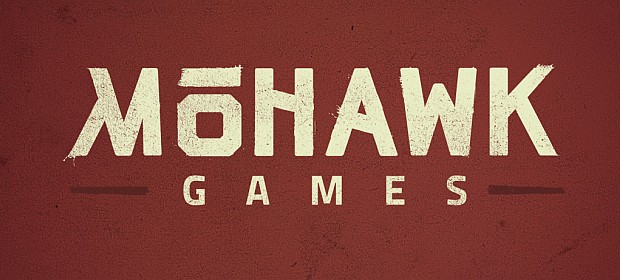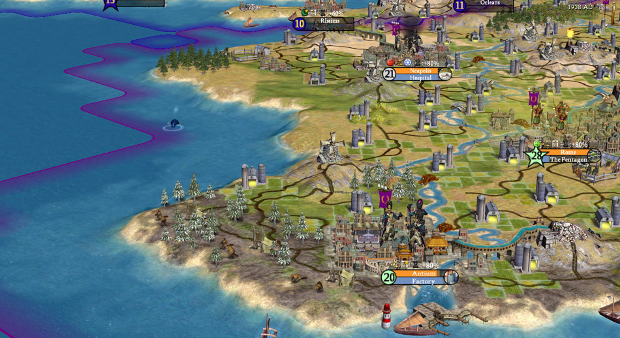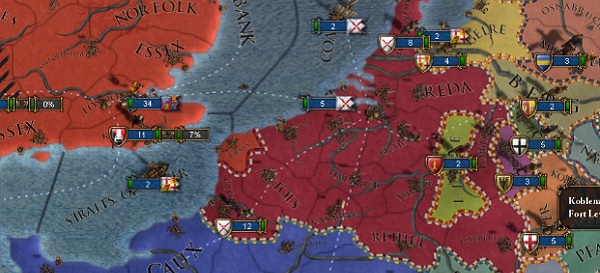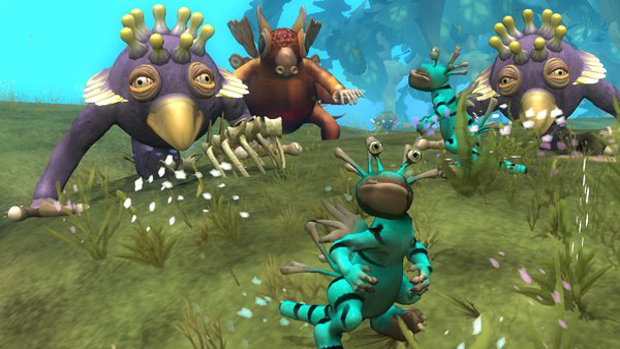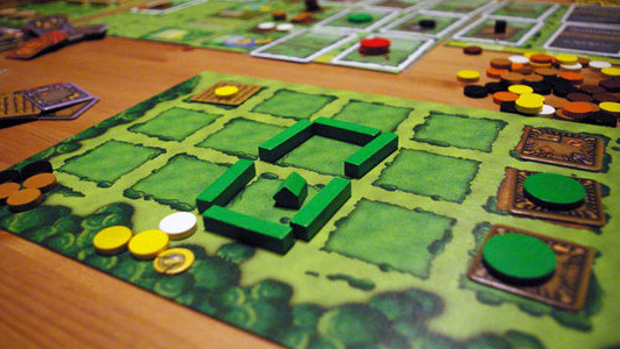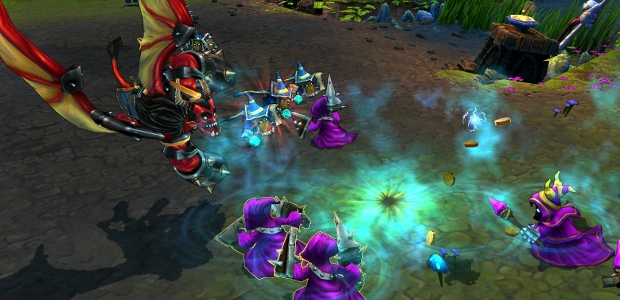Former Civilization IV Lead On Mars Game, Revitalizing RTS
Mohawks And Martians, Pt 1
Mohawk Games is an excellent name for a company. And so it is that former Civilization IV lead designer and Spore man Soren Johnson approaches me sporting the company haircut. It's a recent trim job for the old headshrub, he tells me, but he wears it well. However, the brain beneath the mohawk - the mind behind some of strategy gaming's greatest greats - is the real main attraction here. Johnson's goal is to design "core strategy games" in conjunction with Civ V art director Dorian Newcomb and in partnership with Galactic Civilizations (no relation) developer Stardock.
First on the docket? A still unnamed Mars economy RTS with no units and 13 different resource types. Is it madness? Probably, but it's the good kind, the kind that drives a man to shave off most of his hair before a business conference, the kind that sounds wicked fun when people exchange fireside tales of their favorite matches.
Go below for a discussion with both men about how the game works, boardgame influences, how videogames might be able to replicate boardgaming's face-to-face appeal, designing strategy that's extremely complex but also accessible, release plans, and heaps more.
RPS: You've announced that Mohawk's working on a strategy game, but what exactly is it? How fast-paced will it be? What's it about?
Johnson: The current game we're making, which we don't really have a name for, we're going to call it Mars right now. It's set on Mars, and it's an RTS. It's about building a little economic engine. There's 13 different types of resources. You have to decide “Well which are the ones I want to produce?” You accumulate some water, maybe turn that water into food, and then you have a stockpile, and then ultimately you really make your money based on the market. All these different resources can be bought or sold at any time, and the price just goes up and down totally dependent on players actions in the game.
So you play a four player game, if three of the players are all buying food then the price of food is going to go up. You get a lot of food, sell it, make more money. We don't present what the price is. We don't think the resources should be worth this much, this is totally dependent on the game. And sometimes players really forget about one specific resource, and they're like, “Wow, can you believe the price of iron in that last game? It was ridiculous, what happened?”
RPS: Do you think it works best primarily as a multiplayer game? Sounds like that definitely adds a layer of boardgame-style enjoyment to it.
Johnson: That's what we've been focusing on right now. The nice thing about developing a game that has a muliplayer side is you're able to try out the mechanics immediately.
Newcomb: You have the best AI starting, because you have the strategy that you can implement. Then you can see other asymmetrical strategies from other people. A lot of times in games when you develop an idea you have to wait until you've completed the AI to obtain that kind of advantage. If it's multiplayer I can take advantage of an idea immediately and get feedback, like “That was awesome," or “That was the worst.”
Johnson: One of our artists had an idea recently. A lot of RTSs, you choose a side before you begin, Protoss or Zerg or Terran or whatever. And that's kind of what we did. There's colony types. And one of our artists was like, “Well how about deciding what colony you want after the game starts? You explore the map and then you choose what you want to be.” And we said, “OK, that sounds really interesting,” and we tried it out the next day. And we got the experience immediately because you're playing a mulitplayer game and it's for real.
If you have a single player game where there isn't really competent AI, you're kind of pretending like you're playing. You know you're going to be able to run rings around the AI. That's one of the advantages of multiplayer. Having said that though, once we're really happy with the game design itself, at that point it's time to really focus on single player.
Newcomb: It really sucks to try to learn a one player game, having your first game be a multiplayer game where you get your butt kicked, it's very frustrating.
Johnson: And the truth with most RTS games, the multiplayer is the glamorous side, the side that gets a lot of the attention. Developers will tell you, 78% of their players really are just there for single player. We totally know that, but it's a question of what order you take things. You know the nice thing about that is, once the game design is done, if you start working on the AI at that point, you're not going to be wasting time having to continually rewrite the AI as the game changes. That's what makes gaming AI so hard. If you're making an AI to play chess, the rules are never going to change. If you make an AI for a game, and someone decides to rip out this one element, [it's totally useless].
RPS: So, it's a game that's largely about economics, but it's a real time strategy. What do you from moment-to-moment? I feel like detailed economics management is often more the domain of turn-based games. Offers more time for chin-stroking, conniving, stat obsessing, etc.
Johnson: So one way you could describe it is it's an RTS without units. You just focus on the buildings and the resources, and so obviously that means that aspect of the game is a lot deeper than you normally see in an RTS. Starcraft has two resources. Age of Empires: Age of Kings has a pretty advanced economic system. It has four resources, food, wood, gold, stone. So we knew that we would need to expand up on that. I think we have 13 resources: energy, water, food, oxygen, fuel, chemicals, iron, steel, copper, and so on and so forth. Each of those resources have different uses. Some are useful for building, some are useful for life support, some are useful mostly just to make money off of.
Newcomb: And how they're useful is unique. We had a big set initially, and we're trying that out, and over the course of it we're swapping out resources, swapping out what they do, swapping out not their inherent value but their value in terms of the hierarchy of building things. We're trying to balance things so that each of those has a purpose in the game, and each of those provides another wrinkle for someone to go in a direction, another choice to make as they play the game. So it's providing the same exact environment with “What do you decide to do now?” Based on what the other players might be doing, what's your opportunity? Which resources come together to form the best strategy?
Johnson: And there's multi levels of resources. Which is something you don't normally see in an RTS. You pick up a cattle and then you turn it into meat, then you go and you ship that to a city or whatever. In our case, you take the water, you turn it into fuel. You take the fuel, you turn it into chemicals. So there's a whole resource tree. That affects the market, because it's pretty easy to create water, so it's easy to drive the price down, flood the market with water so to speak. But it's pretty hard to turn that all the way to chemicals. That's usually the reason why the price of chemicals keeps going up. There's demand for it but there's not enough supply.
RPS: You said there aren't necessarily units, so what is the interface? How does it work?
Johnson: When I started the project I set a high level of constraint. “We're not going to select units. We're not going to move units around.” There were still kind of units to move around and do things, like, “I'm going to claim this tile,” then this little probe pops up from the colony and goes out and claims the tile. “I want to build a steel mill.” Then an engineer pops up, travels to the spot, and builds a steel mill. You've got a water mine. It produces water, then a little blimp pops up and flies the water back to your colony.
But these aren't things you control, like in SimCity or one of the other city builder games. But at the same time we went back and forth on, well, there's exploration units. Should you control those? We had pirate units. Maybe should you control those? Then we had defensive units to ward off the pirates. So at some point I was trying to make it work for exploration units, and said “Ok, you just set exploration flags, and the units will automatically figure out where they're going.” Like the pirates and stuff. That wasn't much fun. It was just a little bit frustrating. You want it to do exactly what you want it to do, and maybe it did, maybe it didn't. There's a reason why RTSs let you select units and do exactly what you want them to, because people like that immediacy.
So we tried that for awhile and was like, “I really want to get away from unit selection because I feel like that's something that really makes RTSs hard for a lot people. That's makes it very inaccessible." And selecting units is not really core to our design. So I was like “Ok. Let's get rid of exploration units. Let's make pirates kind of one shot things. You just launch a pirate mission. Or you do exploration, you scan tiles. You have a certain number of scans, you click a tile and it reveals, you click a tile and it reveals. It's more of a top level thing. So far that's working out pretty well.
RPS: You mentioned simplifying that whole element of it. But I think a lot of people who are really into core strategy games like that complexity, that's their thing. When they hear that people want to simplify it they immediately think, “Oh no! They're gonna make it for people who don't play our games. They're gonna ruin it!” So why is that your core design philosophy?
Johnson: To me when I think about games, it's like a bucket. You have so many rules and pistons and mechanics and content that you can pour into that bucket. For an RTS the bucket is a little bit smaller than it is for a turn based game. With a game like Civ, Civ originally was a real-time game, way back in 1990 when it originated. Sid Meier, because he was inspired by SimCity, was like, “Oh I'll just do that, except at a global level.” The thing was, it was just too much for people to handle as an RTS, so he made a turn-based game.
And now people, if they don't understand something they can take time to learn about it. So the amount of complexity you can put in a game goes up. Now if you make a real time game, specifically the Paradox games which are sort of real time games, but if it's a game that's fast paced and 30 minutes long and competitive, that bucket is a little bit smaller. And most RTS games fill that bucket with combat and units and special powers and abilities, and that's great. We're taking that stuff out of the bucket, but what we're putting into the bucket is this complicated resource tree, and discovery system, and tiles, and auctions, and building chains, and free market.
Newcomb: Ultimately, what ends up having the most gains as a player, the way that you won the game is to focus on one or two things really well. And what we're trying to do is to make sure we're providing the focus on those two things. If I'm playing a multiplayer game with Soren and he does something, I need to respond to it or plan to respond to it. It may involve building something, it may involve watching the price of things go up or down, it may involve attacking him.
When you introduce the mechanic, especially in a pretty quick paced game, “How do I select these units? How do I move them from point to point? And if I'm getting attacked how do I handle that?”, that ended up just becoming a distraction. Instead of it enhancing the strategic possibilities, anything becomes a distraction from what your main focus is of how you want to win, how you want to play the game. Because if you're just, “Man this is just another thing keeping me from playing the game that I thought I was playing," then it's probably not that important. The thought of simplifying, streamlining it so that it becomes a free to play massive timesink or something, that's very different. I think a game could be very complex at its heart. What we're trying to do is distill it.
Johnson: The simplification is a tool to put focus on the parts of the game that you care most about. And when when you play Mars there's this market that's always visible. Thirteen resources, thirteen prices, thirteen stockpiles, thirteen rates going up, going down. That's actually a lot to keep track of. That's actually where your focus should be because a big part of the game is interacting with... so there will be these random events. Suddenly there will be a food shortage, and if I don't pay attention to that Dorian will be able to sell his food while the price is really high. Where as if you both see it, if we both see the price rise up, and I often have the sense that both of us have our finger on the sell button, and which one of us is going to sell? We both want to sell!
Newcomb: At the highest. You don't want to see the price drop and know that's when someone else got all of the money.
Johnson: The type of games were talking about right there, there's not really a game out there that does this.
Newcomb: It's interesting that we've been playing a lot of board games that have slightly dynamic markets where you can bid or out bid someone. inherently those games take longer to play. Once you introduce negotiations into the game it double, triples the time to play. The nice thing about this is we have a full negotiation system that's up and running for everyone, but it happens real time. So if I want to sell stuff at a certain price I can do that at my choosing while Soren's doing different task. And he can undercut me over time, and I'm like, “Crap, I'll never get that value.”
RPS: It's interesting to me because you are making a very specific type of game. Mars Economic Simulator is very specific compared to, for instance Civ, which was the world, and Spore, which is evolution - these concepts that people can grapple onto very easily. Whereas this is a lot more, “OK, here's this one thing that you're going to do. Hope you like Mars! Hope you like economies!” So do you think this will appeal to people who like your work in those other games?
Johnson: Well I hope so. I think there's two aspects there. One is, it is certainly a narrower scope. I think in some sense that's more appropriate in general than Civ's scope. The scope with a Civ game is somewhat insane, and it's crazy that it even works at all. Usually making a Civ game meant just trying to plug all of the holes to try and keep it from totally bursting. This is hopefully more of the right scope for a game.
But more importantly as an independent studio, we're five guys making a game. We have only a certain amount of resources to work with. When we worked on Civ 4 we had a big team and a big publisher behind it. There was a lot to draw on. There was already a huge fan base out there. The scope was like the blessing of the project, you knew that was part of it. You knew that you had resources to realize it. We can't make something that huge right now. We have to pick our battles, right?
RPS: Boardgames are obviously a big inspiration here, and you've been talking about negotiation phases and stuff like that. But I think the real intrigue of boardgames - maybe the thing that makes, say, economies and management able to stand alone in games like Agricola - is that you're face to face with someone, and you're really getting into it and talking to them directly. Personally, I almost always end up accidentally role-playing, pretending to be a character. So it's not like, “I sure do love farming!” Instead it's, “I like people. I like interacting with people.” For obvious reasons you can't really replicate that in a PC game. Are you worried about not having that appeal in the game?
Johnson: Well we do and we can. One aspect of the game that works really well for that is the auction house. There are times during the game where the game will keep running, but there will be an auction pops up in the corner, and that will be for a specific plot of land, or an extra claim.
Or a specific technology. Our technology is going to be a little bit different in that it's more like a patent system, which means that there's maybe twelve unique technologies, and if you get a specific one no one else can have it. So it's not like you're all going to spec into the same resource tree. It's more like the game will allow twelve technology cards, and if I grab one card then I've got that technology locked down. But a patent might be held up for auction, and you know, I bid on it, Dorian bids on it, I bid on it, I know who's bidding on it.
It gets really heated. In fact we played a game recently where afterwards me and Dorian talked about how it went down. We're pretty sure that he lost the game because he won the early auction...
Newcomb: Yeah, I kind of cut my throat to get the thing I thought I wanted, and I was dying the rest of the game.
Johnson: Was it teleportation? I forget what it was. Anyway something important came up in auction.
Dorian: And it was a critical thing.
Johnson: And early in the game you don't have much money, but you have some resources. So we both went all-in on resources, to try to outbid the other one. We both pushed ourselves to the total limit, and he won the claim, but then he didn't have any resources to work with, so it was a really hollow victory.
Newcomb: Ideally this is a game that you want to play with your friends. My belief is that, I think this is one of the best games I've worked on. I want it to be the best game I've worked on, but there's a lot of work to do to make that happen. I love all the games I've worked on in general. But the thing that's great about this game is it reminds me of when I was playing games growing up, when you play boardgames with your neighbors or friends.
And in general, I'm not saying that this wouldn't be a great game to play with strangers, but the best introduction to this is, “Hey, I want to play this game with you. I want to show you 'cause we haven't played a game like this before. We've played tons of games where we shot each other. We've played tons of games where we raced each other. We've played tons of long-term turn based strategy games. This is a game where I want to see how you solve this problem, I want to see how you compete in this type of environment.”
In some ways the best way to learn the game and play the game is on a LAN in, like, a college setting. You know, have a friend come over with their laptop. That being said once you get used to the game it has a really appealing just straight up competition level style of play. And a lot of MOBAs are doing that now, where you play something that... in general if you're playing something like that your team has to be really good, otherwise it's really frustrating. I think there are a lot of people who play with just their friends, against strangers. I could imagine this being that sort of game. I think those games are best played with a team you know well, not just random hookups, like, “Oooh! I've been paired for my skill set!”
RPS: At some point are you planning to heavily support voice chat, so people can really engage on that level? I guess what I mean is the difference between just having voice chat as an option versus it being like, “Hey, this is a pretty optimal way to play! You guys should try this.”
Newcomb: I think voice chat would be optimal. Actually, I would love to be able to even send video messages to people.
Johnson: Another thing I like to push is the voice chat not just for the game, but after the game. One of the best parts for me in Civ appeared afterward, when people got together and figured out what happened. Mars should have some really incredible end game screens, where it shows the prices that go up, and the crash tier, and what happened here? Why did it drop? A picture of the stock prices as they go up and down, to see what was correlated to what. This one player won, how did they win? Well they made this much money off this specific resource, that's worth a try.
RPS: You initially said this was going to come to Steam Early Access. Is that still the plan?
Johnson: Yeah. We haven't really made any official announcements or anything, but we're definitely in favor of the Early Access concept.
Newcomb: What we're trying to do is create a small studio that's sustainable. We want to be sure that we're able to take chances with our games. A lot of really passionate gamers wonder why aren't the big studios making games like this anymore.
Big studios have never made games the way they thought they made them. Even games like Civilization II that came out, internally there's, “Oh, we don't think our game's going to do well." But then it's a huge success. I think a lot of the time, large studios have a hard time understanding what the hardcore gamer wants, outside of the hardcore super market, and they can still miss that.
So what we're really trying to do is create a small studio where we can take chances. Small enough where we can make a Martian economics RTS game, and the success of each Early Access period will give us a taste of how successful we're going to be, and do people actually want to take those chances and risks in the game design choices that we're making.
Johnson: One of the big inspirations from board games is not even just the mechanics, but the diversity of topics. If you look at the top 100 games of boardgames you'll see an incredible variety of types of game. Way more than the variety you'll see in videogames, definitely in strategy games. If we're able to keep our team small we'll be able to reduce some of the risk of development. Like with Kickstarter, or Early Access or whatever, then yeah you take some risks and go out on a limb to start out with.
RPS: Do you have a general timeframe for Early Access, or are you still too early in development to be making those sorts of plans?
Johnson: I have it in my mind, but I don't want to say just yet. I want to get it out there soon. It's very playable already. It's fun right now. It mostly is a question of can we get the game to production level that is good enough, but not embarrassing.
Newcomb: The first artist to join the team was an interface artist, because we really wanted to make sure the interface was very playable, and it's laid out in a way that's clean but also attractive. So we have all of those things that we want to make sure are good before we release it. You don't want to release a game that's obtuse or unclear and have people say, “I don't understand what's going on.” I'd rather them say, “I know what's going on, I don't know how to get there. Teach me how to play better.”
Check back soon for part two, in which we discuss Firefly as one of Mars' primary influences, the (supposed) decline of RTSes, the weird state of triple-A development, and whether or not Johnson will ever do anything on the scale of Civilization ever again. Also mohawks.

